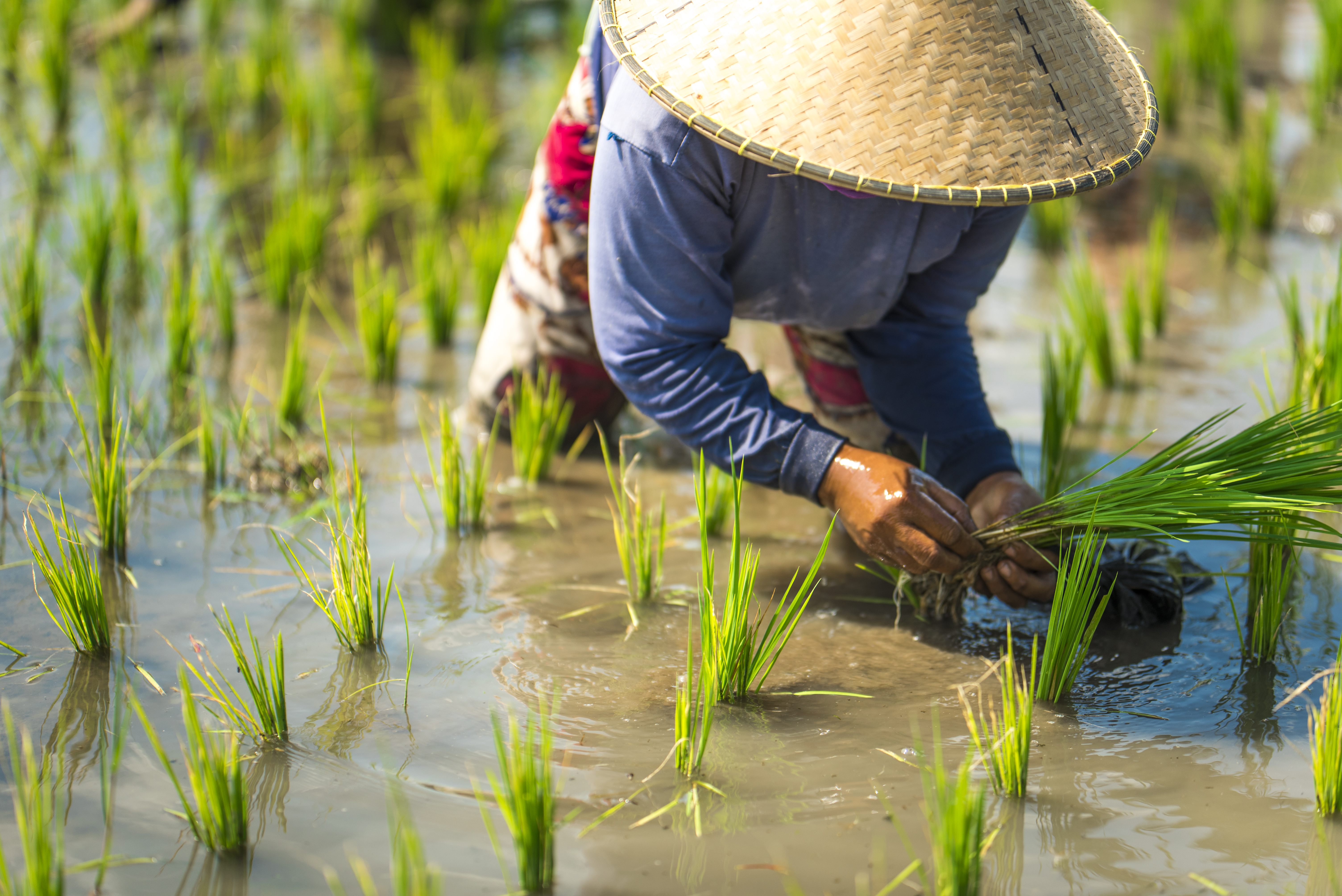Empowering Indonesian rice farmers with sustainable practices for better livelihoods
Globally, 20 million hectares of rice fields are prone to floods; another 20 million hectares are susceptible to drought. Rice cultivation uses 40% of the world’s freshwater.
Rice is the staple food for more than half of the world’s population. Over in Indonesia, rice is one of the most important agricultural crops. Nearly 60% of the country’s total rice production comes from Java alone. However, producing this popular food comes with a high price for the climate and environment.
The challenge
Rice cultivation releases greenhouse gas emissions and rice straws are traditionally burned in paddy fields post-harvest, creating extreme air pollution. Aside that, rice production uses a large amount of fresh water and inappropriate practices involving chemical inputs that damage the soil and water, as well as the health of farmers.
It is estimated growing rice uses between 30-40% of the world’s irrigation water. Farmers in Java typically use an irrigated lowland production system which takes, on average, more than 1,400 litres of water to produce just 1kg of rice.
This massive water use reduces freshwater availability for human consumption, aquatic ecosystems and other uses, contributing to increasing frequency and severity of water conflicts.
Rice producers are already now amongst the most vulnerable for the impact of climate change: drought, floods, high temperatures and raising sea levels are direct threats to their livelihoods.
In addition, an unfortunate cycle exists where increased chemical use to maintain crop yield leads to higher production costs, thus resulting in rice production being less attractive to farmers, and a growing number of farmers are choosing to leave agriculture to move to urban areas.
As rice remains a low-priced crop, producers in Central Java lack incentive to adopt more sustainable practices, compounding environmental stresses and often trapping producers in poverty.
Rice farmers, cultivators and related stakeholders
- Lack of awareness and technical knowledge regarding use of sustainable rice cultivation methods
- Overcoming traditional methods of rice cultivation methods relying on chemical inputs
- Ensuring optimal input and production cost to support farmers' livelihoods
- Demonstrating that rice farming can provide a good livelihood

The solution
By giving smallholder farmers access to practical information to help them understand and implement sustainable practices best suited to their context, rice could be grown more efficiently. This means reducing unnecessary use of water, agrochemicals and other inputs. Simultaneously, these farmers will also be able to understand how these methods can directly benefit their livelihoods.
Through this, we are striving to build a community where these individuals will be able to utilise their capacity and resources to sufficiently support their needs for the years to come. This includes in terms of producing seeds and fertilisers, possessing millers, and collecting straws as a value-added measure.
As a result, the farmers in Java could produce at lower cost, increase net income, protect their health, while also reducing the environmental footprint of rice cultivation. Our aim is to develop an entrepreneurial mindset amongst these farmers, who will be capable of producing business plans for sustainable production.
Seeing is believing
This project, implemented in partnership with Rikolto and funded by CISU / DANIDA, is the first of a three phase programme ultimately aimed at driving sustainable rice production in Indonesia. In this first phase (April 2021 – March 2022), we will be focusing on three districts within Central Java: Bovolali, Klaten and Sragen. A demonstration plot is created in each of these districts where farmers can see for themselves what can be achieved through the reduced input methods.
This phase is also called the ‘Awareness stage’ where we will reach out to farmers within these districts to introduce the Sustainable Rice Cultivation model. A total of 30 farmers will receive training on the methods, and they will each train another 70 farmers, thus reaching a total of 300 farmers across the three districts. Aside that, short informational videos will be developed to be shared with the targeted farmers.
During this Awareness stage, the project team will organise meetings with local authorities for conceptual introduction. To enhance their acknowledgments of sustainable rice cultivation models, the project will raise awareness through education materials which are also targeted to these farmers.
In the pipeline
Following the successful completion of the first phase, the project will move on to the second phase which includes the development of a farmer-friendly mobile application for the ease of recording farming activities. This application will be supported by a simple scientific indicator to aid in measuring their performance against sustainable rice farming standards.
The third phase will expand to include refined methods and a broader implementation scope with more groups of farmers within the region.
We are also looking toward developing a community of practices, made up of either farmers, private entities or academic professionals who are interested in this programme. These individuals will be involved in sharing knowledge and experience while spreading the word to others relevant to the programme.
Through this, we hope to encourage active involvement and ensure long-term continuity of the programme.
Together we are stronger

Low Carbon Rice: Reducing climate impact of rice production in Indonesia
(Lompat ke versi Bahasa Indonesia)Rice feeds half of the world’s population on a daily basis, but it is also an essential driver o...

Empowering Indonesian rice farmers with sustainable practices for better livelihoods
Globally, 20 million hectares of rice fields are prone to floods; another 20 million hectares are susceptible to drought. Rice cul...




